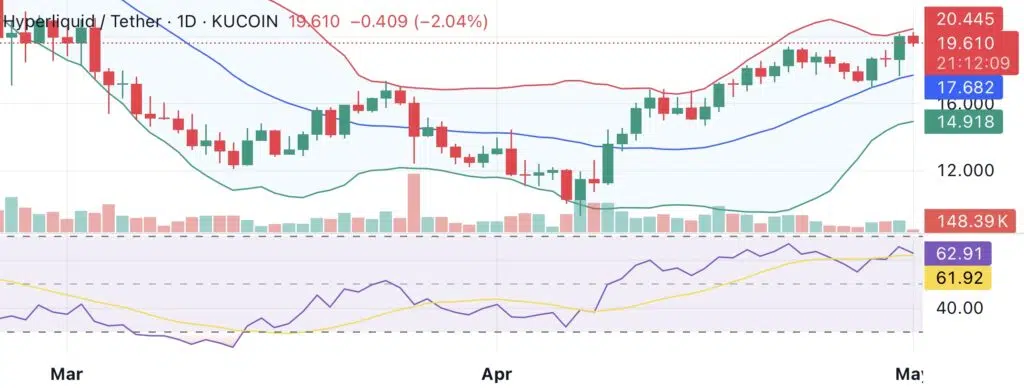Crypto investment is gaining momentum in North Carolina, as the state’s House of Representatives passed the Digital Assets Investment Act (House Bill 92) on April 30 with a 71–44 vote, moving the proposal to the state Senate for further consideration.
Introduced in February by Republican House Speaker Destin Hall, the legislation would authorize the state treasurer to allocate up to 5% of North Carolina’s public funds into approved cryptocurrencies and digital assets. This marks a bold step toward formalizing crypto investment within the state’s public financial strategy. If enacted, the bill would significantly advance North Carolina’s integration of digital assets into its official portfolio positioning the state at the forefront of crypto adoption in public finance.
New North Carolina bill mandates Third-Party oversight for Crypto Investments
Under the proposed Digital Assets Investment Act, any investment made by the North Carolina state treasurer into cryptocurrencies would require an independent third-party assessment to ensure proper custody, risk management, and regulatory compliance measures are in place. A recent amendment to the bill also allows the treasurer to explore whether members of the state’s public retirement and deferred compensation plans could gain exposure to digital assets through exchange-traded products (ETPs).
In a parallel effort to modernize state-level investment strategies, the North Carolina House also passed the State Investment Modernization Act (House Bill 506) with overwhelming support, securing a 110–3 vote. This bill proposes the creation of the North Carolina Investment Authority (NCIA), an independent body that would assume responsibility for the state’s investment decisions, transferring authority away from the treasurer. If enacted, the NCIA not the treasurer would be authorized to allocate funds to digital assets, subject to board approval and external validation.
State Treasurer Brad Briner has voiced support for both legislative measures, according to local outlet NC Newsline, signaling a coordinated push to bring the state’s financial management systems into the digital era. With these moves, North Carolina joins a growing list of states, including Arizona, in advancing frameworks that support the integration of crypto assets into public investment portfolios.
JUST IN: 🇺🇸 North Carolina #Bitcoin Reserve legislation passes the House. pic.twitter.com/pHy8b5dUsZ
— Bitcoin Magazine (@BitcoinMagazine) April 30, 2025
Arizona, for example, recently passed two crypto-focused reserve bills SB 1025 and SB 1373 which now await approval from Governor Katie Hobbs. Should North Carolina’s proposals also pass into law, the state would become one of the few in the U.S. to actively incorporate digital assets into its official financial infrastructure.
Nationwide, the momentum for Bitcoin adoption continues to grow. According to data from Bitcoin Law, 47 Bitcoin reserve bills have been introduced across 26 states, with 41 bills currently active. Among the latest developments, Kentucky Governor Andy Beshear recently signed House Bill 701, also known as the “Bitcoin Rights” bill, into law solidifying the state’s support for protecting digital asset users and promoting blockchain innovation.
Public Companies Boost Bitcoin Holdings by Over 16% in Q1 2025
Publicly traded companies increased their Bitcoin holdings by 16.1% in the first quarter of 2025, reflecting sustained institutional interest in the flagship cryptocurrency despite ongoing market volatility.
According to a report from crypto asset manager Bitwise, total corporate holdings rose to approximately 688,000 BTC by the end of Q1, with firms adding 95,431 BTC over the three-month period. Based on Bitcoin’s closing price of $82,445 at the end of the quarter, the combined value of these holdings reached $56.7 billion marking a 2.2% increase in portfolio value compared to the previous quarter.
In a recent example of this growing trend, Semler Scientific, a U.S.-based healthcare technology company, announced a fresh $10 million investment in Bitcoin, reinforcing its strategic shift toward digital asset reserves. This latest acquisition brings the company’s total Bitcoin holdings to over 3,300 BTC, now worth approximately $300 million at current market prices.
These developments underscore the deepening integration of Bitcoin into corporate treasury strategies, signaling increased confidence in digital assets as a long-term store of value and inflation hedge among institutional players.
TOKEN2049: Eric Trump says the current Financial System is ‘Broken’ and Crypto is the future
Eric Trump talks to World Liberty Financial’s Zach Witkoff and Tron creator Justin Sun about how the institutional banks will be left ‘in the dust’ if they fail to embrace crypto.

From Banks to Blockchain: Eric Trump and Leaders push for a Decentralized Future
Speaking at a fireside chat during TOKEN2049 on May 1, Eric Trump shared personal insights into how his family’s experience with traditional financial institutions led him to embrace cryptocurrency. Reflecting on being “canceled” by banks due to their political affiliations, Trump said, “Modern finance is absolutely broken. When the banks came after our family, I’ll never forget it. We became the most canceled people in the world all because of our association with U.S. politics.”
He emphasized that this treatment catalyzed his deeper interest in digital assets, stating, “I truly believe that cryptocurrency and our venture into it is going to make the big banks regret their actions.” Trump criticized how slow and outdated traditional banking processes remain, pointing to loan applications that often take 90 to 120 days, compared to the speed and transparency enabled by blockchain technology.
“They’re still pushing paper forms for tasks that blockchain could complete instantly cheaper, faster, and more efficiently,” he added, highlighting the inefficiencies of legacy systems.
Tron founder Justin Sun echoed Trump’s concerns, observing that public trust in financial institutions in the United States has significantly declined. “Nobody knows what’s going on in the bank. They can move $5 million around without the customer even knowing. But on blockchain, that level of opacity doesn’t exist everything is fully transparent,” Sun noted.
Zach Witkoff, co-founder of World Liberty Financial, explained that their platform was created to address these very deficiencies in the traditional financial system. The goal, he said, is to democratize access to finance by merging decentralized finance (DeFi) with traditional banking.
“We’ll wake up in four or five years to a world where DeFi and traditional finance have merged into a unified ecosystem one that can’t be separated again,” Witkoff concluded, expressing optimism about a future where financial inclusion is powered by blockchain innovation.
Traditional finance is at risk of being left behind.
At TOKEN2049, Zach Witkoff, co-founder of World Liberty Financial, emphasized that traditional financial institutions must adapt to an increasingly crypto-driven economy or risk becoming obsolete. He warned that as the global financial landscape evolves, resistance to innovation could leave legacy players behind. “Time will tell which path they choose,” Witkoff noted. “But hopefully, they’ll land on the right side of history.”
Eric Trump echoed this sentiment, arguing that it may be extremely difficult for large financial institutions to shift toward crypto because their entire infrastructure is built around outdated systems that blockchain technology renders unnecessary. “If the banks don’t embrace this now if they don’t buy into crypto they’re going to go extinct,” Trump warned. “Because you’re actually eliminating the function that justifies their existence.”
Trump further highlighted the massive gap in innovation, pointing out that crypto is advancing “100 times faster” than traditional banks. He praised crypto’s ability to democratize financial access, especially for the unbanked or underserved populations. “What crypto really does is level the playing field globally,” he said. “You don’t need access to Jamie Dimon or the biggest financial institutions if you have a phone, you’re in.”
This conversation underscored a broader theme at the conference: decentralized finance is no longer a niche alternative it’s fast becoming a global standard. Institutions that fail to recognize this shift may soon find themselves on the wrong side of history.
Hyperliquid surges past $20 as new features boost investor interest
Following several weeks of sideways trading, Hyperliquid has regained the $20 mark, indicating a potential change in market momentum.

After weeks of sideways movement, Hyperliquid (HYPE) has reclaimed the $20 level, signaling a potential shift in momentum. On the daily chart, a clear bounce above the middle Bollinger Band is visible, with the price now testing the upper band. The Relative Strength Index (RSI) currently stands at 62.91, reflecting growing bullish momentum, though not yet indicating overbought conditions.
While a decisive breakout has yet to materialize, steady trading volume supports the current upward move. The MACD (Moving Average Convergence Divergence) remains in a buy zone, and HYPE continues to trade above its 50-day moving average both signs of underlying strength. Although most oscillators remain neutral, the momentum trend is gradually improving. If bulls can maintain control above $20, the next resistance zone is likely between $21 and $22. However, failure to hold current levels could see a retest of the $18 support area.
This rebound also aligns with a 12% increase in open interest, according to Coinglass, pointing to growing trader engagement. April’s trading volume came in at $4.01 billion, slightly higher than March’s $4 billion. However, total value locked (TVL) remains subdued at $289 million, still down over 50% from its February peak of $700 million, based on DefiLlama data. This sharp drop, along with slowing stablecoin inflows, may signal waning user confidence or capital rotation into other protocols.
Part of the renewed enthusiasm may stem from recent feature rollouts. On April 21, Hyperliquid integrated with Cypher, a Web3 payment gateway enabling users to spend both spot and perpetual balances at over 100 million merchants worldwide. Cypher’s card supports usage in more than 150 countries, with compatibility for Apple Pay and Google Pay. Additionally, a wrapped testnet stablecoin, WHLUSDC, was also launched.
Looking ahead, Hyperliquid is set to roll out a new fee and staking system on May 5. Users who stake HYPE will be eligible for trading fee discounts ranging from 5% to 40%, with spot and perpetual volumes counted jointly spot volume receiving double weighting. A new feature will also allow users to link staking and trading accounts for added flexibility, though the link is permanent and cannot be reversed.
Whether HYPE can sustain its position above $20 may depend on how traders respond to these upcoming changes, especially in the context of broader market sentiment and liquidity flows.


